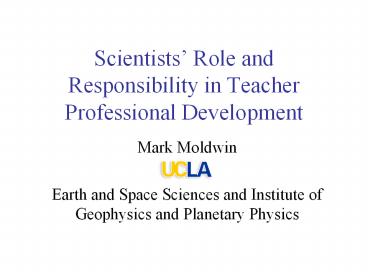Scientists - PowerPoint PPT Presentation
1 / 11
Title:
Scientists
Description:
Scientists' Role and Responsibility in Teacher Professional ... Brings role model and ... Role of Scientists in the Professional Development of Science ... – PowerPoint PPT presentation
Number of Views:55
Avg rating:3.0/5.0
Title: Scientists
1
Scientists Role and Responsibility in Teacher
Professional Development
- Mark Moldwin
- Earth and Space Sciences and Institute of
Geophysics and Planetary Physics
2
Why Participate in Teacher Professional
Development?
- Well trained AND educated teachers have positive
impact on student learning. - Science Content/Skills/Experience often lacking
in pre-service science education programs. - In Service Professional Development often
disconnected from discipline. - NAS Report Educating Teachers 2001
3
Connection to Research Funding
- NASA requires 1-2 of all new mission budgets be
devoted to education and public outreach. - NSF Criterion 2 What are the broader impacts of
the proposed activity? Three of the five
sub-questions - How well does the activity advance discovery
and understanding while promoting teaching,
training and learning? - How well does the proposed activity broaden the
participation of underrepresented groups? - Will the results be disseminated broadly to
enhance scientific and technological
understanding?
4
No Really - Why Get Involved?
- , Tenure, prestige???
- Helps focus your own teaching.
- Helps your students see the big picture.
- Brings role model and mentor into Lab.
- Raises awareness of teaching/education
methodologies, literature. - Expands your professional community for ideas,
networking, and own professional development.
5
Steps to Get Involved Become Informed
- Read National Science Education Standards
- Learn about existing programs on your campus, in
your college, dept. - Contact the Science Education School or
Department - Write a RET supplement
- Join NSTA, AAPT etc.
- Volunteer at your kids school
6
Developing Teacher Workshops
- Identify your
- Goals improve content, curriculum dev
- Audience in or pre-service, K-14
- Scale National, regional, local
- Partners Science Ed, District teachers, Existing
on-campus programs - Funding options NSF, NASA, DOE, NOAA, AFOSR
Foundations, State, Corporations, Districts - Your Comfort Zone
7
Lessons Learned
- Cant do it alone - form partnerships
- Science Education is a very different Community,
Language, Literature - Develop Highly Focused and Realistic Goals, Plan,
and Expected Outcomes - STEAL IDEAS, EXISTING PROGRAMS
- Gary Gladding 2002
- ASSESSMENT, ASSESSMENT, ASSESSMENT
- Maximize Impact
8
Attributes of Successful Programs
- Broad Partnerships (Science and Science Ed
Faculty, Teachers, Administrators) - Treat Teachers as Professionals
- Designed to meet school-based needs
- Opportunities for continued involvement
- Continuous Evaluation
- New partnerships formed due to program
- Effective recruitment and advertisement
- Buy in from both academic and district
administration. - NRC Role of Scientists Report, 1996
9
National High School Space Weather Network
10
Make Pre-College Education Professional
Development Part of your Teaching and Service
Repertoire
- Start Small but Think Big
- We have a vital role in pre-college education and
need to take our responsibility seriously. - Wide range of time commitments possible
- (visit classroom, partner with local teacher,
become part of existing program, develop your own
workshop, run for local school board, write an
op-ed or Physics Teacher article) - BECOME INFORMED AND INVOLVED
11
References
- National Science Education Standards
http//www.nap.edu/readingroom/books/nses - Role of Scientists in the Professional
Development of Science Teachers,
http//www.nap.edu/readingroom/books/role - Bybee, R. W. (1998), Improving precollege science
education--The involvement of scientists and
engineers. Enlisting the support of scientists
and engineers to translate science education
standards into effective science programs. J.
Coll. Sci. Teach. 27, 324-328. - Morrow, C., The diversity of roles for scientists
in K-14 Education and Public Outreach,
http//www.spacescience.org (go to Quick links at
bottom and click Papers on EPO































